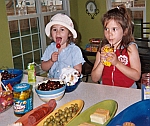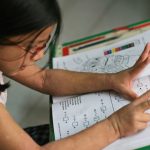 You can enrich your child’s language and vocabulary for free and without buying extra books or electronic toys either.
You can enrich your child’s language and vocabulary for free and without buying extra books or electronic toys either.
All you need to do is talk to your child about the world around her. It sounds rather simplistic doesn’t it? But, it’s true.
In this day and age when we have become a little too dependant on the latest and newest handheld gaming device or educational learning system, we don’t really need them.
When you take your child to pre-school and if they are not at pre-school yet, then take them for a walk. This provides an amazing time for learning language. But you must have patience. You must have patience to walk at your child’s pace and to answer all the questions she might have.
If your child stops to explore a spider crawling along the ground, then let her. If she wants to pick up some leaves, or stones, or twigs, let her.
Take your time and enjoy the walk. Enjoy the experience of actually stopping to stare and answering all the questions your little one might have. And to stretch her mind further, why not ask her questions too? Ask her why she thinks the sky might be blue? Why the grass might be green? You’ll be amazed and equally amused at the answers you get back. They serve to tell you just how little minds think!
Shopping For Groceries Can Be A Mathematical Delight
Grocery shopping is a great opportunity to enhance your child’s vocabulary and is brilliant for introducing your child, or improving on (depending on how old they are) their numeracy skills.
Before you go shopping why not let your child open the refrigerator and see what needs to be bought? What is running out? Is the fruit bowl empty? Do we have any bananas? Do we need more apples and pears?
What about bread? Do we have any bread at home? Or do we have half a loaf? Do we need to get some more?
Without it sounding like work, you are actually teaching your children about fractions and measurements here, as well as empty or full. You are involving them in decisions about whether something needs to be replaced, based on how much of that something you currently have. Can you see how complex this is? But, you can make it fun for your child and shopping for grocery supplies is a fun way.
Once your at the supermarket, this opens up another huge opportunity for language and numeracy.
Again, depending on how old your child is you can make this as complex or as simple as you want.
You could ask them to get you 4 apples, or a pint of milk. Or what about 1 kilo of onions? 2 kilos of potatoes?
Give your child instructions and see how well they do at following them. Ask them to get you a packet of frozen peas which are in the frozen vegetable section.
Hopefully, this article will have given you some idea of how easy it is to use everyday events, even those as routine as shopping for groceries, as a learning experience for your children.
